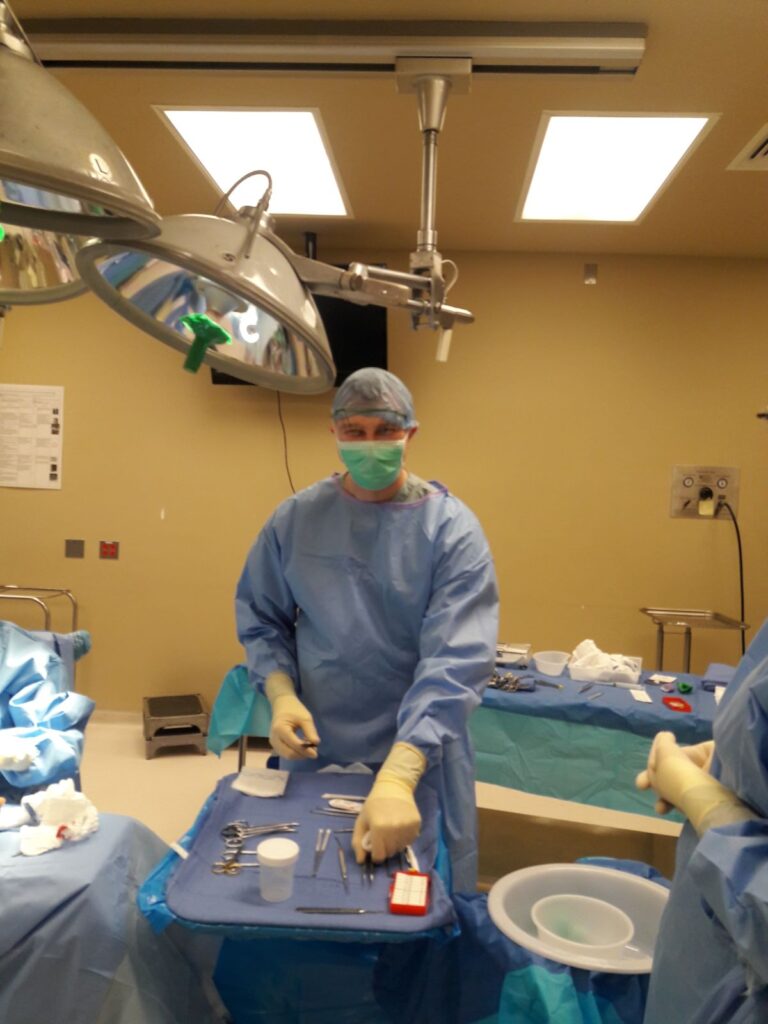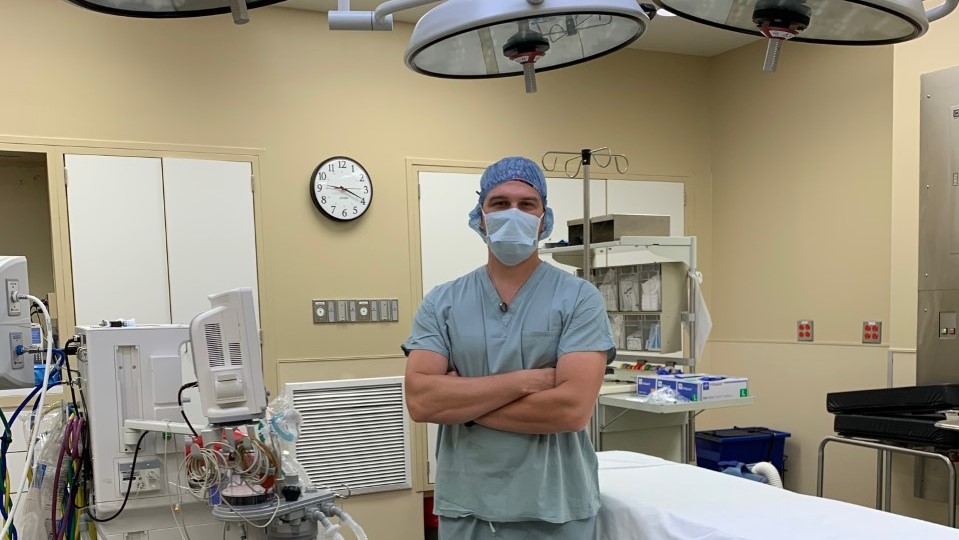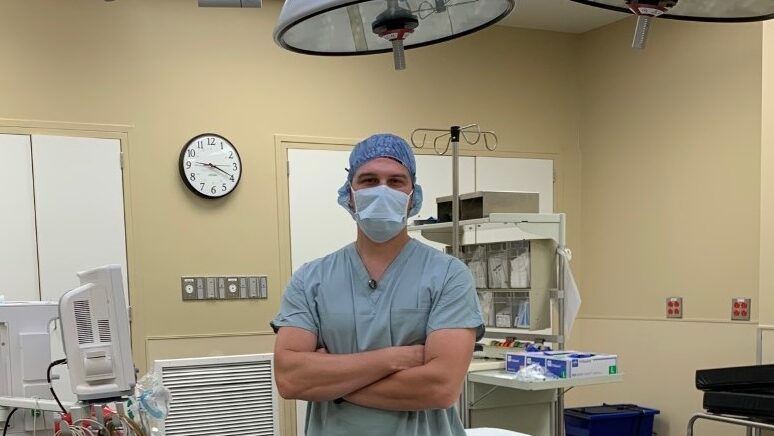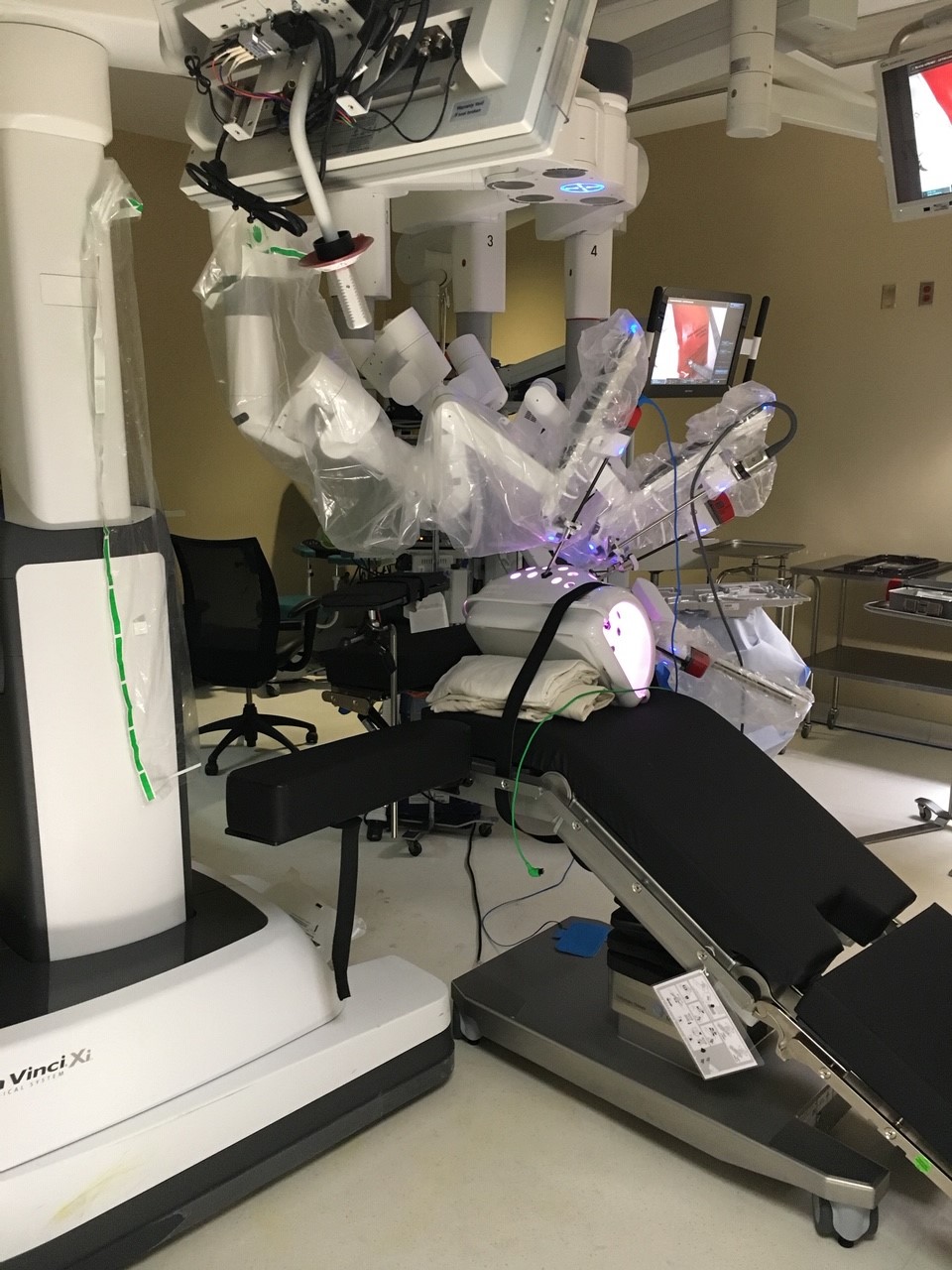Workforce WindsorEssex interviews different professionals for an inside look into their work.
As we take a look at workers in essential positions during the COVID-19 pandemic, we spoke with Kyle who works across the border in Detroit as a Clinical Coordinator. You can learn more about Registered Nurses through a detailed Career Profile.
What is your job title? What does an average day look like for you?
I am a Registered Nurse. My title is Clinical Coordinator. I work in a hospital in Detroit that has 18 operating rooms. My main role is helping staff prepare for surgery on a daily basis. My specialties are Ear, Nose, Throat (ENT) and Cardiothoracic (CT or open heart surgery). I also help trouble shoot any issues with equipment or instruments during cases and often will circulate and scrub surgeries.
What was the education/training needed for your job? Any additional training for your current position?
I completed a 4 year degree in Nursing at the University of Windsor. At the time, I had to write a separate exam to have the rights to work in Michigan. All my operating room (OR) training was done on the job after I was hired since it’s not a typical area of nursing that you learn about in school.
Why & when did you choose this career? What have you learned since you started?
I chose this career late in high school. The real story is that my girlfriend (now wife) wanted to be a nurse and it seemed like a great idea. I knew I wanted to work in a field that would have endless opportunity and allow me to help others. I have learned that you really have to love what you do in order to be successful and happy in such a demanding career. I’ve always had a passion for learning especially when it came to science and the human body.
What is the best part of your job?
The best part of my job is that no day is ever the same. There are always new things to learn and I’m lucky enough to be at a hospital in a major U.S city where we do so many different types of surgery. I have seen some incredible things during my time there, many of which would top even the most outlandish things shown on tv.

What is something challenging about your job?
Since there is a lot going on in an OR there are a lot of different health care disciplines that you need to learn to work with. From the surgeons themselves, to anaesthesia and the many other groups you have to find a balance between the work and stress of everything going on. It’s also challenging to coordinate everything that’s needed for surgery on a daily basis. Some days I can have 5 or 6 different OR’s that fall under my specialties with upwards of 15 surgeries and it’s up to me to contact different companies and gather equipment that I need to make sure will be available for each one.
What advice would you give to someone interested in pursuing the career?
Make sure that you are going into it for the right reasons. The healthcare field can be incredibly demanding physically and emotionally, but equally as rewarding if you truly want to make a difference and help others.
What is the biggest thing you’ve learned on the job?
You’ll never know everything and there’s always room to be better and grow. Some of my coworkers have worked in my department for over 50 years and are in their 70’s. They love what they do but more importantly they never stop learning and have changed their practice as medicine as a whole has evolved. They have watched open surgeries become minimally invasive laparoscopic surgery and now within the past decade robotic surgery has become the new normal. There is always a new invention around the corner that will advance the way our patients are cared for.
How would you say COVID-19 has affected your day-to-day work? (i.e., job duties, commute, check-in process, etc.)
The commute is shorter due to less border traffic, but we have to complete screening and a temperature check on our way into work now, so that takes extra time. We wear masks for the entire day, even outside of the operating room. In the operating room, our ability to provide surgical services was hugely impacted by the overflow of COVID 19 patients, so a lot of the staff had to go work in other areas of the hospital to help out, and some others experienced lay offs. We are starting to get back to somewhat of a normal day to day routine in the OR but with added precautions to ensure both the staff and our patients are as safe as possible.
What has it been like to be an Essential Worker during a world-wide pandemic?
These have honestly been the most difficult times in my career. On one hand, I feel so proud to be helping during these times, but on the other hand, I am constantly worried of what is coming next. There has been incredible support from the community, but healthcare professionals have also experienced some really awful discrimination and bullying related to working in Michigan and crossing the border daily for work. Some of my colleagues have been refused health services and entry to businesses and banks. It’s really not fair to have to face these difficulties when we are very well protected at work, just like the healthcare workers are in Canada.
Have you experienced loss or personal struggles since the beginning of the pandemic? How have you and your co-workers coped with working through the shut-down?
This has been incredibly difficult for my family and my coworkers. We had many coworkers get very sick during the worst of it and even had someone pass away. We are all constantly terrified that we are going to get sick and/or bring the virus home to our family. We try to find comfort in doing everything we can to protect ourselves and our loved ones while we are at work. We are extremely cautious and tedious about our PPE, and about our social distancing outside of work. When I get home, I have a rigorous decontamination process that I follow before coming in the house and before joining my family. This can sometimes add half an hour to my time away from my daughter, and she often cries when I get home and can’t come upstairs to play right away. My wife is also a nurse and she had to take a leave of absence to hold down the fort at home while I work due to complications with childcare.
Could you share how being an essential worker during the pandemic has made this more personally fulfilling career?
The overall community support has really made a difference during this difficult time. There were weeks where we received donated lunches and treats almost every day while at work, and it really helped to feel like we were appreciated through all of this. Especially in the operating room, we don’t always get to hear how patients are doing after the fact since they go to the floor or go home after surgery, so often we don’t get the “thanks” like nurses in other areas might get where families would visit daily and see the same staff caring for their loved one.

________________________________________________________________________________________________________________________________
Thank you to Kyle for the interview, and for supplying images.
Questions or Comments? Please email sfram@workforcewindsoressex.com
Are you an Essential Worker? Would you be willing to share your experience with us? Please contact info@workforcewindsoressex.com, Subject: Essential Worker Portal.


